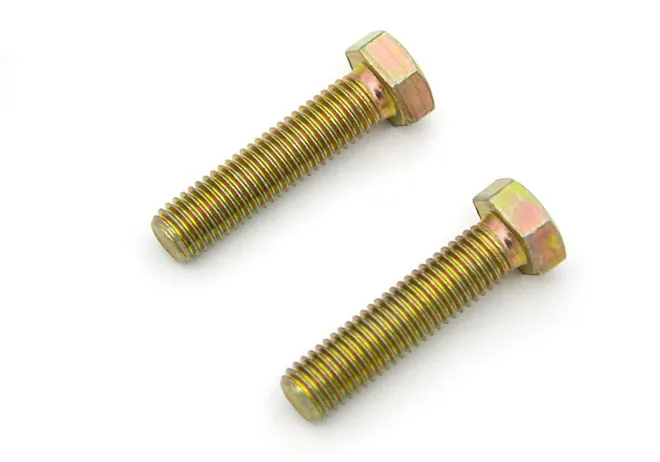OEM 3 and 4 Bolts for Superior Performance and Compatibility in Various Applications
Dec . 04, 2024 02:28 Back to list
OEM 3 and 4 Bolts for Superior Performance and Compatibility in Various Applications
Understanding OEM 3, 4 Bolts Importance and Applications
In the world of manufacturing and assembly, the term OEM (Original Equipment Manufacturer) stands out as a critical component of quality and reliability in the supply chain. When talking about OEM components, bolts play a significant role, especially OEM 3 and OEM 4 bolts. These specific types of bolts are crucial in various applications across a wide range of industries, including automotive, aerospace, construction, and machinery. This article will explore what OEM 3 and OEM 4 bolts are, their characteristics, applications, and the reasons behind their importance in manufacturing operations.
What Are OEM 3 and OEM 4 Bolts?
OEM 3 and OEM 4 bolts refer to specific standards and specifications set by manufacturers for their products. Typically, these designations indicate certain dimensions, strength ratings, thread types, and material compositions that align with the requirements of the original equipment. For instance, OEM 3 bolts might be made to fit a particular engine model, while OEM 4 bolts could be designed specifically for a different application, such as securing a chassis or a transmission casing.
The classification normally includes various grades, lengths, and coatings that meet strict industry standards to ensure durability and performance. Commonly used materials for these bolts include high-strength steel, stainless steel, or specialized alloys that can withstand extreme conditions, such as high temperatures or corrosive environments.
Characteristics of OEM 3 and OEM 4 Bolts
1. Precision Engineering OEM bolts are manufactured to tight tolerances to ensure they fit perfectly in their designated applications. This precision is critical in maintaining the integrity of the assembly and achieving optimal performance.
2. Material Quality The quality of materials used in OEM bolts directly impacts their performance. Using high-grade steel or specialized alloys ensures that the bolts can handle the stress and strain they will encounter during use.
3. Specificity OEM bolts are designed for specific applications, which means they often include features such as unique thread patterns or lengths that may not be available with generic bolts. This specificity helps in minimizing the risks of failure during operation.
4. Regulatory Compliance OEM bolts may also comply with industry regulations and certifications, making them a safer choice for manufacturers who must adhere to safety standards.
Applications of OEM 3 and OEM 4 Bolts
OEM 3 and OEM 4 bolts have varied applications that reflect their engineering and material properties. Here are some common areas where you will find them
oem 3 4 bolts

1. Automotive Industry In cars and trucks, OEM bolts are crucial in assembling engines, suspensions, and gearboxes. Their reliability is essential for vehicle safety and performance.
2. Aerospace Sector In aviation, where safety is paramount, OEM bolts are used in assembling aircraft frames, engines, and various components subjected to high-stress conditions.
3. Industrial Machinery Machinery in manufacturing plants often relies on OEM bolts for construction and assembly. These components support heavy loads and must withstand vibrations and wear over time.
4. Construction In building structures, OEM bolts secure various materials, ensuring that constructions remain stable and safe for use by the public.
Importance of Using OEM Bolts
Choosing OEM 3 and OEM 4 bolts is not just about following protocols; it is about ensuring quality and reliability in products. Manufacturers who opt for these bolts benefit in several ways
- Peace of Mind Knowing that the bolts used meet the original specifications can significantly reduce the risk of component failure, offering peace of mind to manufacturers and end-users.
- Enhanced Performance Using precisely engineered OEM bolts allows for optimized performance of the overall assembly, leading to improved efficiency.
- Long-term Cost Savings While OEM bolts may have a higher upfront cost than generic alternatives, their durability usually translates into lower maintenance and replacement costs in the long run.
Conclusion
In conclusion, OEM 3 and OEM 4 bolts play a vital role in ensuring the integrity and reliability of various assemblies across numerous industries. Their precision engineering, material quality, and specific applications make them indispensable for manufacturers seeking to deliver safe and efficient products. As industries continue to evolve and demand higher standards, the importance of using OEM components, particularly bolts, will remain a priority for quality assurance and operational excellence. Whether in the automotive industry or aerospace, the significance of OEM bolts cannot be overstated, and they represent a critical element in the landscape of modern manufacturing.
Latest news
-
High-Quality Panel Stud Bolt Reliable Panel Stud Bolt Factory & Suppliers
NewsJul.08,2025
-
High-Precision Fine Thread Locknuts Manufacturer & Supplier Custom Solutions
NewsJul.08,2025
-
PH Imperial Stud Bolt – High Strength Fasteners from Leading Supplier & Factory
NewsJul.07,2025
-
High-Quality Allen Wrench Bolts Leading Factory, Company & Suppliers
NewsJul.07,2025
-
Wholesale Ball Stud Bolt - High Quality Supplier & Factory Price Reliable Wholesale Ball Stud Bolt Company
NewsJul.06,2025
-
High-Strength Alloy Bolts Manufacturer & Supplier Quality Alloy Fasteners Factory
NewsJul.06,2025
